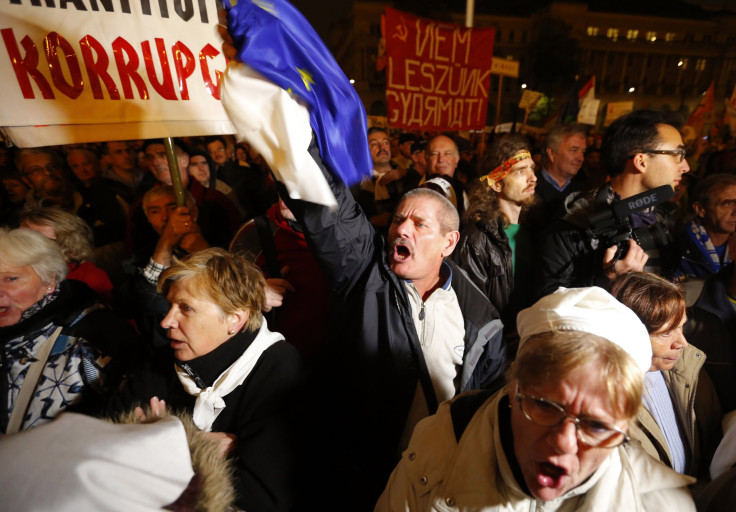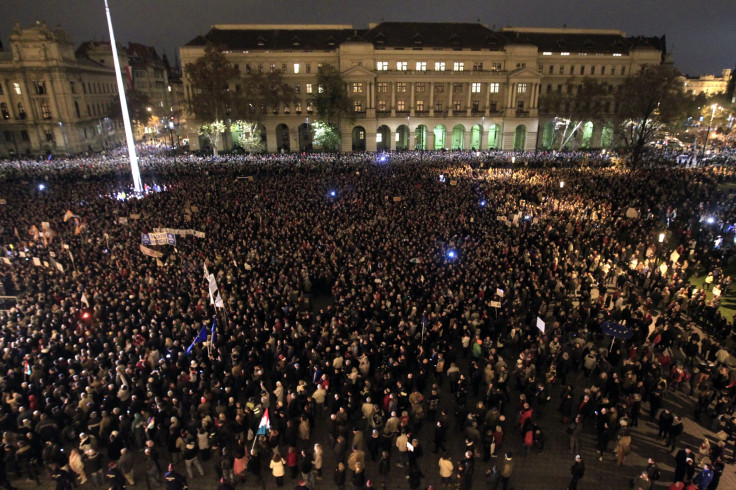Is Hungary The Next Ukraine? Protests Show Country Ripe For Conflict Between Russia And Europe

A protest movement in Hungary over corruption and an increasingly pro-Russian leadership broke out this week, raising questions about whether the former communist nation is on the verge of becoming the next Ukraine. Hungary is more stable than Ukraine, which has been besieged by sectarian conflict for months, and seems less likely to fall into violent conflict, but growing anti-government demonstrations could become another battleground between Europe and Russia.
The wave of Hungarian protests is focused on Hungarian Prime Minister Viktor Orban’s increasingly pro-Russian governance. Many shouted “Europe, Europe!” at Monday’s “Public Outrage Day” protest and one protester told AFP demonstrators "don’t want Orban to take us towards Putin and Russia.” Others chanted for Orban to resign.
The chants and gripes with Orban are eerily similar to those Ukraine's Euromaidan protesters lodged against former President Viktor Yanukovych, who fled the country in late February after four months of violent protests over his decision to sign a $15 billion investment deal with Russia and reject a popular bid to move closer to Europe economically. The decision mobilized pro-European Ukrainians and saw a new pro-Western transitional government come to power after Yanukovych was ousted. That largely divided Ukrainians along the line of being either pro-Russian or pro-Western.
Some Ukrainians, many of whom are ethnic Russians and live in the heavily Russian east, sought to distance themselves from the pro-Western government. Russia annexed Crimea, a southern Ukraine region with close ties to Russia, arguing it was protecting Russians living there. No shots were fired there, but that wasn't the case in eastern Ukraine where pro-Russian rebels took up arms and declared a separatist state. The U.S. and EU accuse Russia of supplying the rebels and directly invading on their behalf.
While Hungary was never as close to Russia as Ukraine, an astounding 72 percent of Hungarians said in 2010 most Hungarians are worse off than they were under communist rule when they were intrinsically linked to Russia and the rest of the Eastern Bloc.
Like Yanukovych, Orban did not initially seek to deepen ties with Russia early in his tenure as prime minister. In fact, the former anti-communist was intent on moving toward Europe, but he’s since turned toward Russia for economic deals and policy inspiration. Hungary is part of the European Union, but it hasn’t yet adopted the euro, which has maintained a distance between it and the rest of the Eurozone.

Orban and the Hungarian parliament, of which Orban’s Fidesz party has a majority two-thirds control, passed a law earlier this month that would allow for a Russian gas pipeline that bypasses Ukraine for Hungary. The EU is starkly opposed. He also signed a $12.5 billion euro deal with Russia to upgrade a nuclear facility in Hungary. The gas deal means Russian giant Gazprom would have an effective monopoly over Hungarian gas, but Orban argues that it will secure Hungarian gas in the future, particularly in light of the Ukrainian crisis.
“Small countries benefit from having a role in pipeline transit and for many of these countries, this is cost-free,” Andrej Nosko, a Budapest energy analyst told the Financial Times, but “it all adds up to a more pro-Russian policy than expected, which is worrying.”
Critics say both deals solidify Hungary’s energy dependence on Russia and the nuclear plant deal, which was taken out with a loan from Russia, increases Hungary’s already high debt. Those criticisms are similar to those levied on Yanukovych in the wake of his decision to sign his $15 billion investment deal with Russia.
Until recently, Orban’s government was largely opposed to Western sanctions on Russia over the Ukrainian crisis, arguing they would hurt the entire global economy. That stirred up objections among European officials, which prompted him to back off.
A series of laws and policies that helped suppress political dissent and put pressure on democratic watchdogs have garnered Orban considerable criticism from his European counterparts as well. The U.S. is keeping a keen eye on Orban too. That was made clear when the U.S. put travel bans on six high-level Hungarian officials for corruption. U.S. Charge d’Affaires Andre Goodfriend openly said the alleged corruption was the result of a weakening democracy in Hungary and the ban was a warning from Washington.
Despite Western condemnation of Orban’s shift toward authoritarianism, Orban isn't afraid to say he admires Russia's, Turkey's and China’s economic and political systems, which he described as “not Western, not liberal, not liberal democracies, maybe not even democracies, and yet making nations successful,” in a speech in July. He went on to advocate for “parting ways with Western European dogmas [and] making ourselves independent from them.”
Orban has been involved in Hungarian politics since it became a democratic nation in 1989 and his Fidesz party remains immensely popular with voters. Fidesz has had a two-thirds majority in parliament for four years and will continue to for another four.
Like many other post-Soviet and communist nations, Hungary sits on the seam of East and West. With both sides tugging at that seam, Hungary is bound to be a flashpoint for future tensions. Unlike Yanukovych, Orban showed he would bow to public sentiment if need be when he backed off his Internet tax proposal after protests earlier this month.
© Copyright IBTimes 2024. All rights reserved.





















